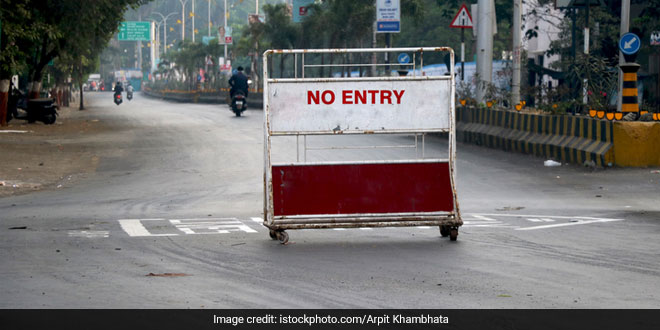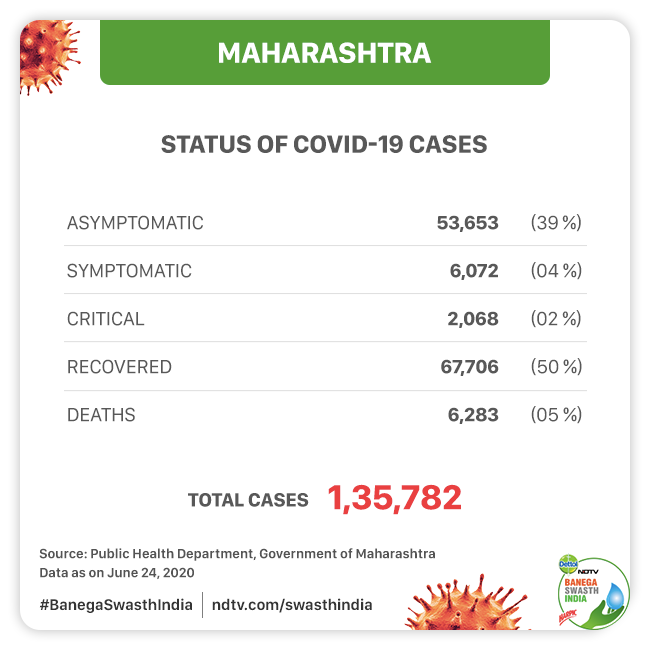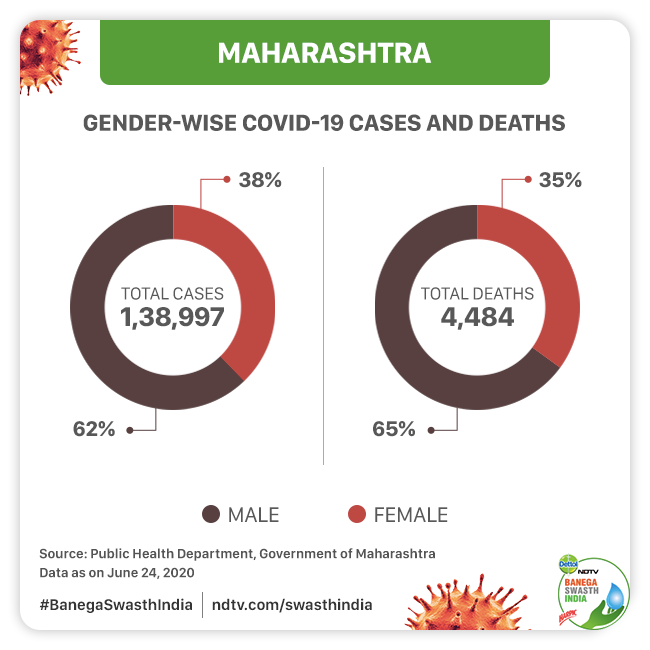Highlights
- Mumbai accounts for half of the total COVID-19 cases in Maharashtra
- There are 1,849 active containment zones in Maharashtra
- Maharashtra is conducting about 5000 tests per million population
New Delhi: Maharashtra reported its first Coronavirus case on March 9, but within four months, it has become the worst affected state in the country with nearly 1.4 lakh cases as of June 24. If we compare it at a global level then Maharashtra would be ranked 17 among worst-affected countries with COVID-19 infections. State’s capital and country’s financial hub Mumbai accounts for half of the total cases in the state and is the worst affected by the pandemic. A government official from Maharashtra Health department told NDTV that as of June 10, there are about 1,849 active containment zones in the state. The government official said,
We have the highest number of patients in the state but we are trying our best to ramp up the testing and healthcare facilities further to fight this virus and eradicate it from the root. I’m positive in the coming months we will witness a flattening of the curve in the state, as we are tirelessly providing all facilities and support to our citizens.
Also Read: Involve Citizens In Fight Against Coronavirus In Maharashtra: Chief Minister Uddhav Thackeray
A total of 4,04,692 people are currently placed under home quarantine and another 26,752 under institutional quarantine in Maharashtra, the official added. However, it is important to note the mortality rate (number of deaths as a percentage of the total number of cases) in Maharashtra, stands at 4.7 per cent, which is more than the national average of 3.17 per cent.
Furthermore, the government of Maharashtra claims to have one of the highest testing rates in the country. There are 105 testing labs in the state, of which 61 are government and 44 are private. The state stands at the fifth place in terms of testing, by conducting about 5000 tests per million population, along with states like Tamil Nadu, Kerala, Andhra Pradesh and Delhi. Maharashtra has conducted over 8 lakh tests (8,26,139) as of June 24.
Nihal Sonavane, an official from a private testing lab in Pune told NDTV that they are overwhelmed with testing samples for COVID-19. He said,
We are leaving no stones unturned when it comes to the testing for COVID-19. We are not sending any person who wants to get tested back but moreover, we encourage them to get tested, as we recognise that this is one of the aspects that can help us fight the virus. We have tested n number of asymptomatic people as well, and will continue to do so.
As per the government data, when there were about 1,35,782 cases in the state on June 24 (the last available analysis was from these cases), 53,653 cases or 39 per cent were asymptomatic. About 6,072 cases or 4 per cent of the total cases were symptomatic while 2,068 or 2 per cent were critical. 50 per cent cases were recovered which amounts to 67,706 cases.
Also Read: Mumbai Imposes Section 144 In The City: Here’s What Is Allowed And What Is Not
As per the government data on June 24, Maharashtra has developed 73 Dedicated COVID Hospital (DCH) across the state, which has 38,594 isolation beds, 5,909 ICU beds and 2,271 ventilators. These DCH have 2, 84,945 available Personal Protective Equipments (PPEs) and 4,65,249 N95 masks for the healthcare workers and patients.
Maharashtra also has 432 Dedicated Health centres (DCHC) with 32,616 isolation beds, 2,157 ICU beds and 574 ventilators. These have 69,276 available PPEs and 2,20,958 N95 masks.
Also Read: No Community Spread Of COVID-19 In Maharashtra, Says Health Minister Rajesh Tope
When it comes to Dedicated COVID Care Centre(DCCC), the state has 1,621 with 207,957 isolation beds but there are no ICU or ventilators as at these centres as these are for patients with mild symptoms these centres are equipped with1,52,877 PPE kits and 3,26,390 N95 masks.
It is important to note that these figures include more than 1,00,000 beds that were obtained by converting several establishments in Mumbai into DCCC.
One of the worst-hit cities in the country, Mumbai converted establishments that include hotels, many new and unoccupied residential complexes, Wankhede Stadium, Nehru Planetarium, Bandra-Kurla Complex (BKC), Mahalaxmi Racecourse, Mahim Nature Park, NESCO Grounds, Nehru Science Centre, among others.
Experts Review Maharashtra’s Fight Against COVID-19
Dr Subhash Salunke, Senior Advisor with Public Health Foundation of India, has more than 30 years’ experience in the Public Health Department holding a whole host of positions spanning from Deputy Director to Director General in the Health Services of Maharashtra. He spoke to NDTV about the current on-ground reality.
Dr Salunke primarily blamed the spike in the cases to the inability of getting a grip on the situation in its early days and said that even IF each and every single traveller from the international airport in Mumbai had followed quarantine, the situation would have been better. He says that if the government would have shelled out some money back then to quarantine the travellers, we would be in a much better condition.
As per my personal perception as well as many other expert groups, we will be approaching the peak of cases in the coming weeks maybe by June end. By now everyone knows that Mumbai is the worst affected city in the country, followed by Pune, Nashik, Solapur in the state.
As Dr Salunke warns of the COVID cases hitting a peak, Dr Pradeep Agailkar from COVID Ward in one of Mumbai’s private hospital spoke to NDTV about the state’s health system preparedness. Dr Agailkar said that 99 per cent of the ICU beds are full in the state capital as we approach a peak, he said,
The latest data from Brihanmumbai Municipal Corporation (BMC) shows that 99 per cent intensive care unit (ICU) beds are full and 94 per cent ventilators are occupied in public and private hospitals in Mumbai. Out of this figure, as many as 12 per cent of the beds are occupied by non-critical patients.
BMC’s commissioner told NDTV that Government officials have instructed hospitals to strictly adhere to admission and discharge guidelines and only admit severely symptomatic patients to allow beds for critical patients, but on the ground, it appears this protocol is not being followed.
The city has 1,094 ICU beds in public and private hospitals. Of them 1,083 are full. There are 464 ventilators in public and private hospitals, of them 437 are occupied. Across Mumbai there are 9,284 beds in Dedicated Covid Hospitals (DCH) and Dedicated Covid Health Centres (DCHC) that treat moderately ill to severely ill patients; 8,635 beds (93 per cent) are already full, he said.
Also Read: Mumbai Can See Flattening Of COVID Curve By Mid-July, Normalcy Of Life By August: Health Expert
To deal with the gap, the government has now deputed IAS officers to monitor private hospitals and the bed management, said and added,
This will ensure patients are discharged when required and only symptomatic people are admitted.
To handle the expected spike, Dr Subhash Salunke says the protocols by Indian Council of Medical Research (ICMR) and Ministry of Health are by now well-known and everyone knows what to do from contact tracing to quarantining. He says that Monitoring is being done at the highest level and from Chief Minister to district Collectors are all involved in it. All the measures are being safely followed to control the cases. When it comes to the health facilities in the state, he said,
Overall on a district wise analysis, I think these are well-organised as per my on-ground experience, and we should give them credit for it.
When asked about his opinion on the status of community transmission in the state, Dr Salunke said,
The challenges initially rose in the most congested areas in the state, for example, Dharavi, from where the infection spread to other places as well. Fortunately the situation in Dharavi Chas seen some improvement by now and displaying a downward trend, same goes for some areas in Pune. Now, the areas which were not in the containment zones earlier, have also started reporting cases more than the containment. This obviously indicates that there is an active community transmission in the state. Whoever says the there is no community transmission, I would like to ask them their definition they are following, my definition of community transmission is that of a public health worker’s and that says there is community transmission. Now what stage has the community transmission reached, I cannot comment on that, but it definitely exists. In my opinion, once the government at least appreciates the reality, they can act and lead an effective fight against COVID.
Also Read: Shilpa Shetty Expresses Gratitude To BMC For ‘Mask Up Challenge’, Shares Picture Wearing Mask
Conclusion: How Can Maharashtra Control The Virus Despite The Expected Spike?
To be able to control the surging cases in the state, experts highly recommend roping in citizens to take responsibility for themselves amid the ongoing pandemic. Dr Salunke wants that as the lockdown relaxes, the virus will spread more easily and hence people need to stay more alert and have an easy access to testing, he said,
With relaxations in the lockdown, the virus will spread more easily. Therefore, I think access to testing should be eased and the testing status can be improved further, even though Maharashtra is testing well. We should be having a capability of performing a test on anybody who wants to get tested, regardless of their symptoms. So that people have the opportunity of getting tested so they could take care of their health and the test result should be available to them promptly.
He also asserts that if a patient is treated well in the first stage of the infection, they may not need critical care. This according to him can be done if governments and municipal authorities improve the status of hospital beds – be it mild symptoms or critical symptoms the state should have the capability to support each case.
Also Read: ‘Heroes Of Mumbai’ Tag For Coronavirus Warriors, Western Railway Pays Tribute Through Wall Murals
NDTV – Dettol Banega Swasth India campaign is an extension of the five-year-old Banega Swachh India initiative helmed by Campaign Ambassador Amitabh Bachchan. It aims to spread awareness about critical health issues facing the country. In wake of the current COVID-19 pandemic, the need for WASH (Water, Sanitation and Hygiene) is reaffirmed as handwashing is one of the ways to prevent Coronavirus infection and other diseases. The campaign highlights the importance of nutrition and healthcare for women and children to prevent maternal and child mortality, fight malnutrition, stunting, wasting, anaemia and disease prevention through vaccines. Importance of programmes like Public Distribution System (PDS), Mid-day Meal Scheme, POSHAN Abhiyan and the role of Aganwadis and ASHA workers are also covered. Only a Swachh or clean India where toilets are used and open defecation free (ODF) status achieved as part of the Swachh Bharat Abhiyan launched by Prime Minister Narendra Modi in 2014, can eradicate diseases like diahorrea and become a Swasth or healthy India. The campaign will continue to cover issues like air pollution, waste management, plastic ban, manual scavenging and sanitation workers and menstrual hygiene.

































